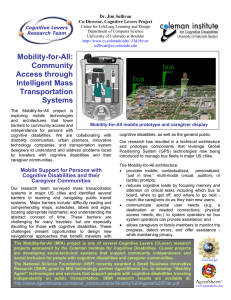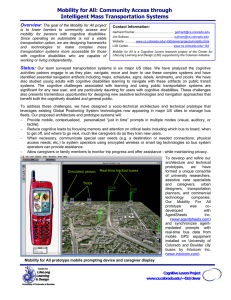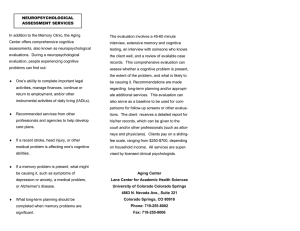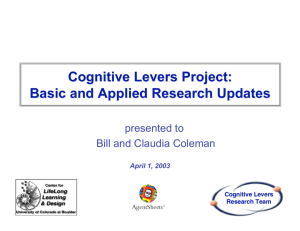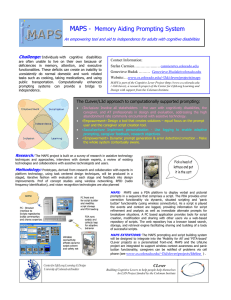Extending the caregiver network: remote support systems for people
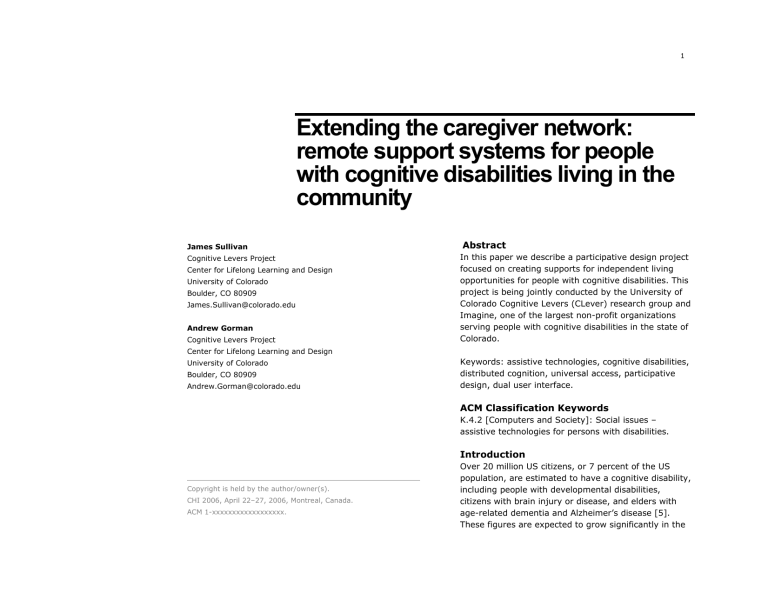
1
Extending the caregiver network: remote support systems for people with cognitive disabilities living in the community
James Sullivan
Cognitive Levers Project
Center for Lifelong Learning and Design
University of Colorado
Boulder, CO 80909
James.Sullivan@colorado.edu
Andrew Gorman
Cognitive Levers Project
Center for Lifelong Learning and Design
University of Colorado
Boulder, CO 80909
Andrew.Gorman@colorado.edu
Copyright is held by the author/owner(s).
CHI 2006, April 22–27, 2006, Montreal, Canada.
ACM 1-xxxxxxxxxxxxxxxxxx.
Abstract
In this paper we describe a participative design project focused on creating supports for independent living opportunities for people with cognitive disabilities. This project is being jointly conducted by the University of
Colorado Cognitive Levers (CLever) research group and
Imagine, one of the largest non-profit organizations serving people with cognitive disabilities in the state of
Colorado.
Keywords: assistive technologies, cognitive disabilities, distributed cognition, universal access, participative design, dual user interface.
ACM Classification Keywords
K.4.2 [Computers and Society]: Social issues – assistive technologies for persons with disabilities.
Introduction
Over 20 million US citizens, or 7 percent of the US population, are estimated to have a cognitive disability, including people with developmental disabilities, citizens with brain injury or disease, and elders with age-related dementia and Alzheimer’s disease [5].
These figures are expected to grow significantly in the
2 coming decades due to rapid advances in routine and acute medical care, allowing more people to survive severe injuries.
Over the last two decades, long-term care for people with cognitive disabilities has steadily moved from institutions with centralized services to residential communities supported by networks of caregivers and service providers. Consumers with cognitive disabilities now have more options to live in semi-independent and independent environments serviced by a network of community caregivers, but these decentralized care models also present scalability challenges to service providers, as well risks in the areas of long-term health and safety for consumers with cognitive disabilities.
Supporting activities for daily living
To reduce risks and potentially adverse consequences of independent living, consumers with cognitive disabilities must demonstrate they can independently perform essential activities for daily living (ADLs) [3], such as meal preparation, personal hygiene and housekeeping chores. To ensure consumer safety, timely and effective assistance must be readily available when unexpected problems arise.
Several research projects have explored the usefulness and efficacy of “stand-alone” computational prompting systems to support simple ADL tasks [6, 14, 15], and some commercial systems are now available [4, 11,
17].
Key limitations of these stand-alone approaches are: (1) only anticipated events during long task sequences can be scripted; and (2) when problems occur, a caregiver is needed to provide personalized on-hand support.
There is a rich literature regarding context-aware and sensor enriched environments for home and medical care settings [1, 10, 12, 18]. These projects are generally focused on one or both of the following goals:
(1) providing “smart assistance” directly to occupants without human support; and, (2) providing greater operational efficiencies to those who manage the home or medical environments.
Extending the caregiver network through distributed socio-technical architectures
This research project is focused on understanding how distributed socio-technical environments can be developed to extend the caregiver network and facilitate effective communications between consumers and caregivers. There are two complementary dimensions of the independent living and remote assistance problem:
• Virtual safety net for the consumer: We are designing and evaluating user interfaces for consumers with a cognitive disabilities who require task prompting and intermittent real-time assistance from a remote caregiver during an ADL; and conversely,
• Task mediation support for the caregiver: We are designing and evaluating decision support and mediation interfaces that integrate data from remote sensing technologies (i.e. video, sound, location, etc.) so a non-technical caregiver can remotely assist a consumer experiencing problems.
Future 1 illustrates an evolving design of a caregiver interface for providing remote support. This interface provides the caregiver with information about the
3 consumer’s task by showing the prompts that the consumer is receiving for each task step and the status of these steps (e.g., when steps are completed and errors that are reported). It also lists protocols for resolving problems and provides two-way video chat.
The objective of this design is to provide the caregiver with sufficient context information to understand and help resolve a problem. Other software interfaces being developed include mobile personal digital assistants
(PDAs) and touch-screen kiosks that provide consumers with computational prompts and access to remote caregivers (earlier work on these prototypes are described in [8]).
Figure 1: A prototype caregiver interface for remote support of people with cognitive disabilities.
Questions for the workshop
We intend to use a combination of laboratory and ethnographic studies in controlled group home settings to design and evaluate our socio-technical systems, but there are obvious risks with generalizing results from these settings with other user populations (both caregivers and consumers) in other care settings and organizations. Two key questions for the workshop include: (1) are there other appropriate research and evaluation methodologies that would be appropriate for designing a such distributed systems; and (2) what user and environmental attributes would be most interesting to assess so one could better understand how well such results might generalize and scale into other care models and environments?
Biographical Sketches
James Sullivan is Co-Director of the Cognitive Levers
Project [9] at the Center for Lifelong Learning and
Design, University of Colorado at Boulder [16]. He is chief architect of the Mobility-for-All (MfA) project [19], a collaborative research effort which resulted in a mobile architecture for people with cognitive disabilities using public transportation [7]. The Mobility-for-All project is now being developed under a National
Science Foundation Phase II Small Business Innovative
Research grant by Agentsheets Inc. [2] Sullivan’s current research interests include active, distributed support systems to augment cognition; distributed cognition; and mobile, context-aware computing environments.
Andrew Gorman is Co-Director of the Cognitive Levers
Project [9] at the Center for Lifelong Learning and
Design, University of Colorado at Boulder [16]. He is chief architect of the Lifeline project [13], an active
4 distributed support system that allows caregivers to provide remote task support to clients with cognitive disabilities [8]. His current research interests include
Computer-Supported Cooperative Work, distributed cognition, and architectures supporting synchronous, geographically distributed collaboration.
Acknowledgements
We are most grateful for the insightful contributions of the Imagine services organization in this research project. Imagine has provided substantial assistance in developing our conceptual architectures, as well as access to caregivers and consumers. We also must thank members of the Cognitive Levers team including
Gerhard Fischer, Anja Kintsch, Stefan Carmien,
Shin’ichi Konomi, Melissa Dawe, Andrew Magill, and
Camille Dodson who have made substantial contributions to this work. This research is funded under the Rehabilitation Engineering Research Center for Advancing Cognitive Technologies (RERC-ACT) which is sponsored by the National Institute for
Disability and Rehabilitation Research (NIDRR) grant
#H133E040019 and a research grant from the Coleman
Institute for Cognitive Disabilities.
References
1. Abowd, G. and Price, E. Aware Home Research Initiative
Website, 2006, at: www.cc.gatech.edu/fce/ahri/ .
2. AS. AgentSheets website, 2004, at: www.agentsheets.com
.
3. Assistive Technology Resource Centers (ATRCs).
Assistive Technology Definitions: Glossary of Terms,
2006, at: www.gatfl.org/ldguide/terms2.htm
.
4. Baesman, B. and Baesman, N. Visions System website,
2003, at: www.thevisionssystem.com
.
5. Braddock, D., Rizzolo, M.C., Thompson, M. and Bell, R.
Emerging technologies and cognitive disability. Journal of Special Education Technology , 19 (4). 49-56.
6. Carmien, S. MAPS Website, 2004, at: www.cs.colorado.edu/~l3d/clever/projects/maps.html
.
7. Carmien, S., Dawe, M., Fischer, G., Gorman, A.,
Kintsch, A. and Sullivan, J.F. Socio-Technical
Environments Supporting People with Cognitive
Disabilities Using Public Transportation. Transactions on
Human-Computer Interaction (ToCHI) . June 2005,
12(2), 233-262.
8. Carmien, S., DePaula, R., Gorman, A. and Kintsch, A.
Increasing Workplace Independence for People with
Cognitive Disabilities by Leveraging Distributed
Cognition among Caregivers and Clients. Computer
Supported Cooperative Work (CSCW) , 13 (5-6), 443-
470.
9. CLever. CLever: Cognitive Levers -- Helping People
Help Themselves, 2005, at: http://l3d.cs.colorado.edu/clever/ .
10. Code Blue. Code Blue Wireless Sensor Networks for
Medical Care, 2006, at: www.eecs.harvard.edu/~mdw/proj/codeblue .
11. Davies, D.K. Ablelink Technologies website, 2004, at: www.ablelinktech.com
.
12. Elite Care Elite Care Website.
13. Gorman, A. LifeLine Website, 2005, at: http://l3d.cs.colorado.edu/clever/projects/lifeline.html
.
14. Graf, P., Klawe, M., McGrenere, J., Purves, B. and
Tremaine, M. Aphasia Project Website, 2006, at: www.cs.princeton.edu/aphasia .
15. Isaac. Isaac project website, 2004, at: www.english.certec.lth.se/Isaac .
16. L3D. Center for LifeLong Learning and Design ,
University of Colorado, Boulder, 2004, at: http://www.cs.colorado.edu/~l3d/ .
17. Levinson, R. PEAT: The Planning and Execution
Assistant and Training System., 2003, at: www.brainaid.com
.
18. Place Lab. Place Website, 2006, at: www.placelab.org/ .
19. Sullivan, J. Mobility for All project, 2004, at: http://www.cs.colorado.edu/~l3d/clever/projects/mobili ty.html
.
